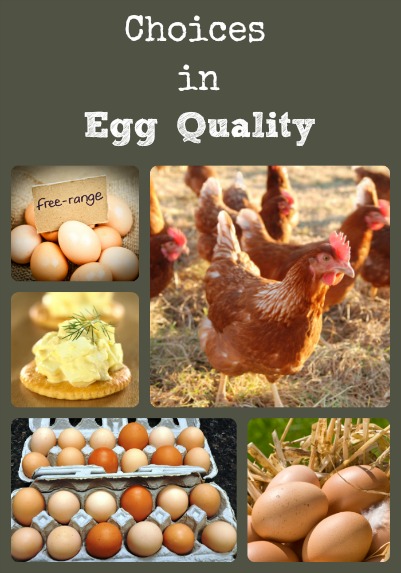
Commercial or “Factory Farmed” Eggs
These are the standard grocery store eggs; and unfortunately, the “farms” that produce these eggs are typically poultry houses where the hens are housed indoors in tiny metal cages. They’re routinely debeaked (part of their beaks are cut off) to prevent the pecking injuries that would normally occur in such tight quarters; and they have no access to the outdoors, sunshine, or natural foods. They’re usually fed low-quality rations that contain antibiotics (the USDA prohibits hormones but allows antibiotics) to control the diseases caused by the overcrowding and inherent filth.
There are no clean nest boxes for the hens to lay their eggs in, so the eggs get dirty. The commercial producers are therefore required to wash the eggs in a chlorine bleach solution that strips away the protective “egg bloom” (see Egg Bloom), and opens the path for detrimental bacteria (like salmonella) to enter the eggs. By law, these eggs must be packed and shipped within thirty days of being laid, so they can be quite old by the time they reach grocery shelves and consumers. These methods of producing eggs are for efficiency and cost reduction; methods that don’t produce healthy hens and high-quality, good-tasting eggs.
Commercial “Cage Free” or “Free Range” Eggs
The USDA doesn’t regulate what “cage-free” or “free-range” means, so supermarket eggs advertised this way often mean that the hens were simply not housed in cages. Many cage-free or free-range hens are crowded wing-to-wing in huge factory sheds and still don’t have access to the outdoors, sunshine, or natural foods. The same disease, antibiotic, dirt, bacteria, and freshness issues that apply to standard commercial eggs often apply to these eggs too.
If hens are raised indoors with plenty of room, clean nests, dust bathing stations, fresh water, and high-quality food; lack of access to the outdoors is not necessarily bad. However, studies have shown that eggs from pastured hens are better than those from most commercially raised hens. Eggs from free-ranging hens across the country were sampled and compared to the USDA data for commercial eggs; and were shown to contain half the cholesterol, twice as many omega-3 fatty acids, and higher levels of vitamin A and E*.
Nutritional Eggs
Some commercial eggs are advertised as being higher in omega-3 fatty acids, lower in cholesterol, or higher in vitamin A and E; however, this is normally accomplished by making additions to the feed; not by actually allowing access to pasture, sunshine, and natural food. For example, producers typically add flaxseed to the feed to increase the omega-3 levels rather than letting the hens roam. Since only the feed is changed and the eggs are produced under the same conditions as standard commercial eggs; there is little improvement in quality and the same disease, antibiotic, dirt, bacteria, and freshness issues exist.
Organic Eggs
The term “organic” is regulated in the US; and hens producing organic eggs must be fed vegetarian, organic feed. Antibiotics are not allowed except in cases of an infectious outbreak. The USDA also requires that organic laying hens not be housed in cages and have access to the outdoors.
Although outdoor access is required by the USDA, many large US commercial organic egg producers do not grant meaningful outdoor access to the hens. Many attach small “porches” to the factory sheds which pass for “outdoor access”. In these cases, the improved feed and lack of antibiotics improve egg quality somewhat; however, the dirt, bacteria, and freshness issues remain.
Obtaining organic certification is quite costly for smaller producers; however, those that do obtain certification generally produce excellent eggs. Unlike the large producers, small organic producers typically provide outdoor access, spacious housing, clean nest boxes, and excellent feed for their hens. Organic eggs produced by small operations are often very high quality and much fresher than other varieties of commercial eggs.
Backyard or Farmstead Eggs
Hens producing eggs on small family farms are typically provided with spacious housing, daily outside access, high-quality feed, and aren’t fed antibiotics because the family producing the eggs is concerned with the quality of food they’re consuming. Often, these eggs are the same high quality as eggs produced by small organic producers; however, they aren’t labeled organic because the certification process is too involved and costly for small family farms. Small farm operations are not required to wash eggs in chlorine solutions either; so the protective “egg bloom” is often retained (eggs should be washed before using, however).
So, buying an egg labeled free-range, cage-free, or even organic doesn’t ensure a good egg. Truly fresh, high-quality eggs come from hens that roam outdoors; and the only way to know if you’re getting great eggs is to know exactly where they’re coming from.
My opinion is biased of course, but I think finding locally pastured hens is the best way to find great-tasting, fresh, quality eggs. Our customers are always telling us that they love our eggs because they’re so much better (taste, color, consistency) than the commercial eggs. It may be necessary to search a bit to find local, pastured hens; but once you’ve found and tasted great eggs, I’ll bet you won’t be happy with commercial eggs anymore.
*2007 study conducted by Mother Earth News

Mike the Gardener says
Raising our own chickens has been a rewarding undertaking. Sure it takes work, but being able to know we are getting safe, healthy eggs is such a benefit. It was a tough sell to my wife early on, but a year later, she absolutely loves it also.
Lesa says
Hi Mike, my husband wasn’t too excited about getting chickens originally either, but now we can’t imagine eating eggs from the grocery store. It’s great knowing what’s going into making them, and you can tell it makes a difference in the way they taste. Glad you’re both loving it too!
Brandon S says
Just a quick question for clarification purposes. You mention that organically certified hens must be fed a vegetarian diet but that they must have outdoors access. As chickens are omnivores, what is to prevent them from eating bugs or other “non-vegetarian” items thus nullifying their organic status? Great post btw. Thanks!
Lesa says
Hi Brandon, good question. Obviously, the chickens are going to eat bugs and such, but they still must be fed vegetarian, organic certified feed. If the farms passed their organic certification, then the fact that the chickens eat their natural diet when outdoors doesn’t nullify their eggs organic status.